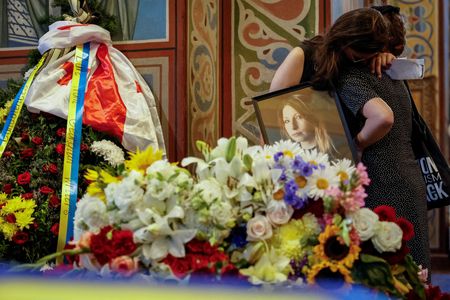 1
1 1
1
By Anna Voitenko and Ivan Lyubysh-Kirdey
KYIV (Reuters) – Tearful mourners filled one of central Kyiv’s main cathedrals on Tuesday to honour a prominent Ukrainian writer and war-crimes researcher killed in a Russian missile strike on a cafe in eastern Ukraine.
Victoria Amelina, 37, died on July 1 from injuries sustained during the June 27 attack, which killed 12 others when Russian forces hit a restaurant packed with civilians in the frontline city of Kramatorsk.
She was an award-winning writer and novelist who also began researching Russian atrocities after the Kremlin’s February 2022 full-scale invasion of Ukraine.
Colleagues described Amelina, who was born in the western city of Lviv, as fiercely dedicated to seeking justice and promoting Ukraine’s cause on the international stage.
“She was a real crusader for truth. She was extraordinarily persistent,” Roman Avramenko, executive director of Truth Hounds, an NGO that documents Russian war crimes, told reporters after the service.
A wide array of writers, journalists and other public intellectuals streamed into the golden-domed St. Michael’s Cathedral to pay tribute. Relatives and friends broke down as they filed past Amelina’s coffin.
Outside, a pair of musicians then sounded traditional Ukrainian alpine horns, called trembitas, as it was loaded into a hearse.
Amelina frequently travelled throughout recently liberated Ukrainian territory to gather evidence of Moscow’s atrocities.
Near the eastern city of Izium last year, she recovered a diary by writer Volodymyr Vakulenko, who had buried it before he was killed by Russian occupation forces.
Amelina helped present a book which included his entries at a major festival in Kyiv just days before her death.
“At a certain point, she realised that what she was encountering could become her new role in literature,” said Tetyana Teren, executive director of PEN Ukraine, a writers’ association.
“Today, this is the most important of roles: documenting what we’re living through, documenting Russian war crimes against our country.”
(Writing by Dan Peleschuk; Editing by Tom Balmforth and Philippa Fletcher)